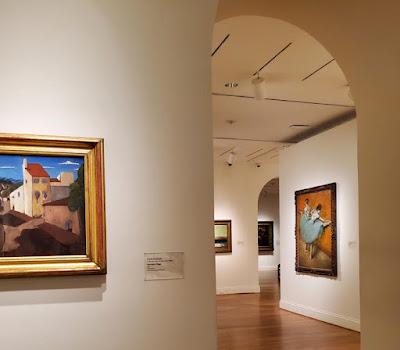
Phillips Collection, Washington, D.C.
Among my favorite art museums in Washington, D.C. is the Phillips Collection, which I had the chance to visit last week. It had been five years since my previous visit, and I discovered that although many of the paintings on exhibit were familiar, there were new ones I hadn't seen before.
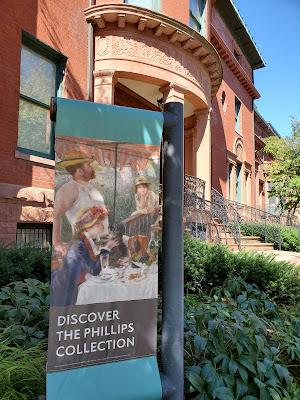
In 1921, Duncan Phillips, and his wife, Marjorie Acker Phillips, a painter, turned the family art collection into a public museum, the Phillips Memorial Gallery,in their home near Dupont Circle in Washington, D.C. The collection soon expanded and the family moved across the street, turning over the entire house to art.
From the beginning, the collection focused on “modern” art, acquiring paintings by French Impressionists such as Monet and Renoir, and Cubists such as Picasso and Braque. Giving equal focus to American and European artists, Phillips juxtaposed works by Winslow Homer, Thomas Eakins, Maurice Prendergast, James Abbott McNeill Whistler and Albert Pinkham Ryder, with canvases by Pierre Bonnard, Édouard Vuillard, and Danish painter Peter Ilsted.
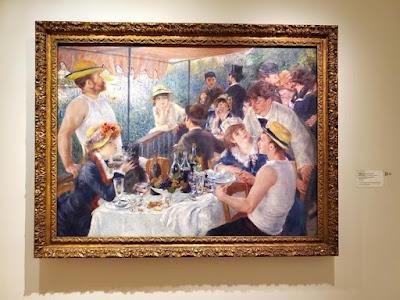
Luncheon of the Boating Party by Auguste Renoir.
The painting that makes the museum famous and draws the most visitors is Renoir’s Luncheon of the Boating Party. It still has pride of place, filling one wall in a room on the second floor of the museum.
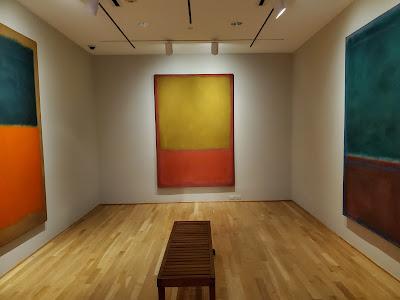
The Rothko Room.
As the collection expanded over the years it became necessary to add a new wing to the museum. Every room is filled with remarkable art. One small room is devoted to four paintings by Mark Rothko, each intense canvas taking up most of each wall. Standing in the middle one feels bathed in color on every side.
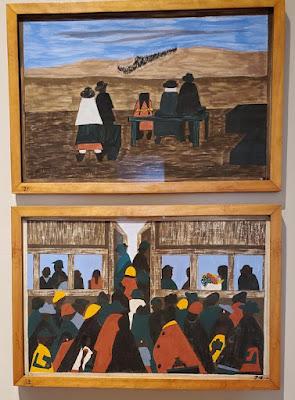
Migration series by Jacob Lawrence. Top: "Families arrived at the station very early. They did not wish to miss their travel north." Bottom: "The migration spread."
Another room contains the paintings of the Jacob Lawrence Immigration Series, depicting the migration of African Americans from the rural South to the urban North. As one circles the room, it is like reading a book. Jacob Lawrence wrote text to go with each painting, and in the gallery it is placed underneath the paintings. In the excellent gift shop on the first floor, you can buy a book in which all the paintings and text have been assembled as a story.
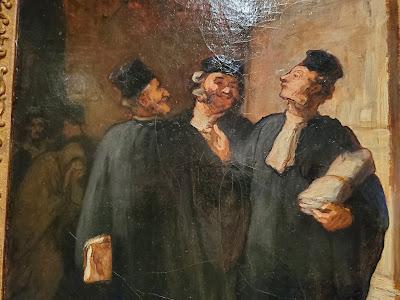
Detail, Three Lawyers by Honore Daumier.
In another room, one wall features a painting and drawings by the French artist Honore Daumier, a master at capturing facial expressions and body language, a skill he used to critique social norms of the 19th Century. Not much has changed in the 170 years since Daumier painted the Three Lawyers. The three men, aught in conversation, feel contemporary.
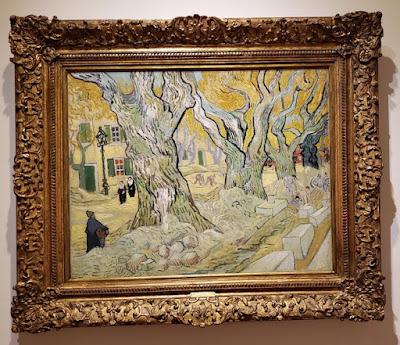
The Road Menders by Vincent Van Gogh.
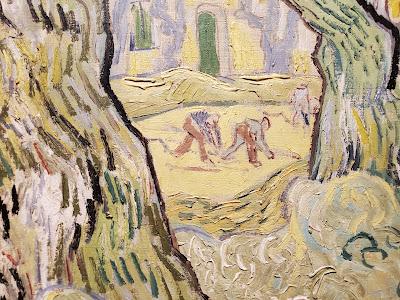
Detail of The Road Menders.
As I made my way through the museum, I became intrigued by the titles of paintings, finding that my first impression of what the painting was about wasn’t always reflected in the title. For instance, in Vincent Van Gogh’s painting Road Menders, I had to look hard to find the tiny figures in the center of the painting making repairs on the road.
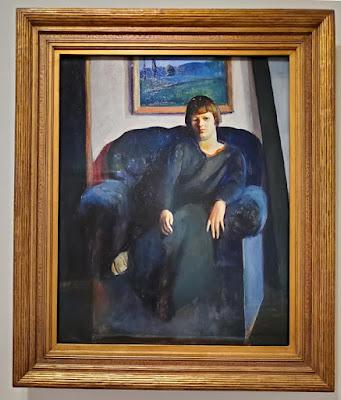
The Blue Armchair by Guy Pene du Bois.
In another painting, The Blue Armchair by Guy Pene du Bois, the chair all but swallows the figure sitting in it, making the title fit perfectly.
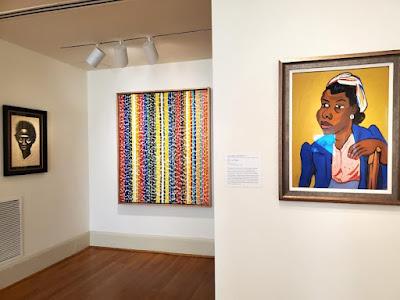
Part of the Where We Meet exhibit. L-R: Black Girl by Elizabeth Catlett; Breeze Rustling Through Fall Flowers by Alma W. Thomas; Girl in a Turban by William H. Johnson.
On the second floor of the museum is a room devoted to an exhibit called Where We Meet, in which pieces from the Phillips Collection and the Howard University Museum of Art are shown together “in conversation”. This exhibit is new since my last visit.
These are just a small sample of the art on display at the Phillips Collection. To see my posts about my visit in 2019, go to:
The Phillips Collection, Part 1: America's First Museum of Modern Art.
and
The Phillips Collection, Part II: What Do You Hang Over the Fireplace?
And to learn about the Family Gallery at the museum, a guide to looking at art with children, go to my recent post at my Art and Books blog.
